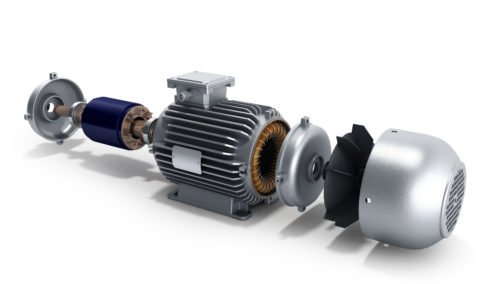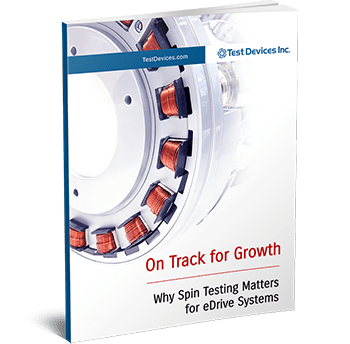TDI On Track for Growth in eDrive Spin Testing Systems
As the race for improved electric drives for electric vehicles, drones, and hybrid drive/propulsion systems accelerates, the need for testing of rotors used in high-speed electric motors is also on track for growth.
Test Devices Inc. (TDI) is pleased to begin offering detailed rotor growth testing as well as a variety of other types of spin tests and expert services to aid in the accelerated development of your high-speed eDrive motors.
Why Spin Test with Test Devices Inc?

In tandem with detailed rotor growth testing, additional spin test options and expert support may also assist in the development of your high-speed motors:
- Detailed rotor growth mapping
This advanced growth measurement technique developed by Schenck is now available at TDI. This method maps the detailed contour of high-speed rotors, accurately capturing variations in a rotor’s geometry as it deforms under spinning conditions. See Figure-1 above for an example.
- Burst test and high-speed video imaging
These tests enhance understanding of the failure limit and failure mode of the rotor. Accurate growth measurement and high-speed video data helps engineers calculate the structural stability of the rotor and its failure mode.
- Fatigue, LCF test (with RT-CDS and growth mapping)
Fatigue and Low Cycle Fatigue (LCF) tests are useful in studying operational cycle fatigue and rotor durability. TDI’s proprietary Real-Time Crack Detection System (RT-CDS) immediately detects fatigue cracks as they happen and halts the test to preserve the damaged rotor before it disintegrates. RT-CDS enables customers to know the exact location and timing of fatigue damage, alleviating the need for painstaking failure investigation work.
- Heated spin test
Thermal management is one of the key concerns in high-speed motor designs. Operating temperature affects material strength as well as the size of the air gap necessary for cooling airflow and accommodating rotor growth due to thermal expansion. Depending on the materials used to construct the rotors, their behavior may vary dramatically when operated at room temperature versus an elevated temperature.
- Imbalance budgeting
TDI offers an expert design analysis service to estimate the range of imbalance levels presented by a given rotor design. This process involves analyzing the effect of the geometric tolerances of a given part and then estimating the influence on the imbalance of the rotor using a mathematical model to simulate the manufacturing process, while also comparing it to more than 10,000 different combinations of tolerance variations. The output from this analysis provides a probability model of the imbalance in the rotor, which can then be used to tune the design, minimize scatter, and avoid surprises at later stages of your fabrication processes.
Learn More
The recent merger of Test Devices Inc. (TDI) and Schenck Corporation combines the expertise of two of the most advanced leaders in spin testing, balancing, and high-speed rotor engineering. Download our eBook to learn more about why spin testing matters for eDrive systems.
To learn how our spin tests and other services can help your R&D efforts, prototyping, or manufacturing operation, contact us or request a quote.




